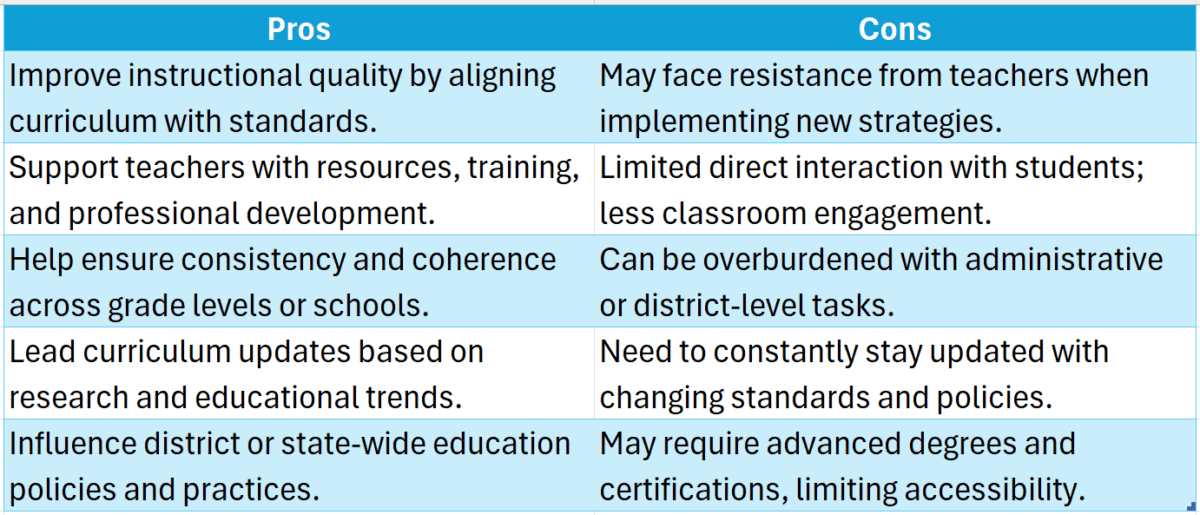
Understanding what curriculum specialists do in K-12 schools is essential for grasping how education evolves. These professionals play a vital role in shaping the learning experiences of students. By focusing on curriculum development and instructional strategies, they ensure that every student receives a high-quality education tailored to their needs.
What Are the Key Responsibilities?
Curriculum specialists have several important duties, including:
- Developing Curriculum: They design and update educational programs to meet state standards.
- Training Teachers: They provide professional development to help teachers implement differentiated education strategies.
- Evaluating Programs: They assess the effectiveness of curricula and make necessary adjustments to improve student outcomes.
Why Are They Important?
Curriculum specialists are crucial because they bridge the gap between educational theory and classroom practice. With an instructional design online degree, they bring expertise that helps create engaging and effective learning environments. Ultimately, their work ensures that all students, regardless of their learning styles, can thrive in school.
Unlock your potential with online degrees—Learn more!
What Skills Do Curriculum Specialists Bring to the Table?

Curriculum specialists play a vital role in K-12 schools, shaping the educational experience for students. They ensure that lessons are engaging and effective, helping teachers meet diverse learning needs. Understanding what these specialists do can shed light on how they enhance learning environments for all students.
Expertise in Instructional Design
Curriculum specialists are experts in instructional design. They create lesson plans that cater to different learning styles, promoting differentiated education. This means they help teachers adapt their methods so every student can succeed, regardless of their unique challenges.
Strong Communication Skills
These specialists also possess strong communication skills. They collaborate with teachers, administrators, and parents to ensure everyone is on the same page. By fostering open dialogue, they help create a supportive learning community that benefits students.
Continuous Learning and Adaptability
Many curriculum specialists hold an instructional design online degree, showcasing their commitment to ongoing education. They stay updated on the latest teaching strategies and educational technologies, ensuring that schools remain at the forefront of effective teaching practices.
How Curriculum Specialists Collaborate with Teachers and Administrators
Curriculum specialists are essential in K-12 schools, working alongside teachers and administrators to enhance student education. Their role is crucial in creating effective learning experiences that positively impact student success and the school environment.
Supporting Teachers
These specialists provide vital support by offering resources and training to teachers. They assist in implementing differentiated education strategies, ensuring that every student can thrive, regardless of their learning style. This collaboration creates a supportive teaching atmosphere.
Designing Effective Curriculum
Curriculum specialists also focus on instructional design. They analyze student performance data to develop tailored curricula that cater to diverse learners. By working closely with teachers, they ensure the curriculum meets educational standards and engages students effectively.
Building Strong Relationships
Additionally, they serve as a bridge between teachers and school administrators, communicating educators’ needs and advocating for necessary resources. This teamwork enhances the educational experience for both teachers and students, fostering a collaborative school environment.
The Impact of Curriculum Specialists on Student Learning Outcomes
Curriculum specialists play a crucial role in K-12 schools, shaping how students learn and succeed. Their expertise in curriculum development and instructional strategies directly influences student learning outcomes. By understanding what curriculum specialists do, we can appreciate their impact on education.
Key Responsibilities
- Curriculum Development: They design and update curriculum materials to ensure they meet educational standards.
- Teacher Support: Curriculum specialists provide training and resources to teachers, helping them implement differentiated education strategies effectively.
- Assessment and Evaluation: They analyze student performance data to refine teaching methods and improve learning experiences.
Benefits of Their Work
- Enhanced Learning: With a focus on instructional design, curriculum specialists help create engaging lessons that cater to diverse learning styles.
- Professional Growth: Many curriculum specialists hold an instructional design online degree, equipping them with the latest educational techniques and theories.
- Student Success: Ultimately, their efforts lead to better student outcomes, fostering a love for learning and academic achievement.
What Are the Key Responsibilities of Curriculum Specialists?
Curriculum specialists play a vital role in K-12 schools, shaping the educational experiences of students. They ensure that the curriculum is effective, engaging, and meets the diverse needs of all learners. Understanding what curriculum specialists do helps us appreciate how they contribute to a better learning environment for everyone.
Curriculum Development
Curriculum specialists design and develop educational programs that align with state standards. They focus on creating materials that support differentiated education, ensuring every student can learn at their own pace and style.
Teacher Support and Training
These specialists provide training and support to teachers, helping them implement new strategies and tools. They often share insights from their instructional design online degree, equipping educators with the skills needed to enhance classroom instruction.
Assessment and Evaluation
Curriculum specialists also assess the effectiveness of the curriculum. They analyze student performance data to make informed decisions about necessary adjustments, ensuring that all students receive a high-quality education.
How Do Curriculum Specialists Stay Current with Educational Trends?
Curriculum specialists play a vital role in K-12 schools by ensuring that students receive high-quality education tailored to their needs. They help teachers design effective lessons and implement strategies that support differentiated education. But how do these specialists stay updated with the ever-changing educational landscape?
Curriculum specialists utilize various methods to keep their knowledge fresh and relevant. Here are some key strategies they employ:
- Professional Development: They attend workshops and conferences to learn about the latest teaching methods and technologies.
- Networking: Connecting with other educators allows them to share ideas and best practices.
- Research: Reading educational journals and articles helps them stay informed about new studies and trends.
- Instructional Design Online Degree: Many specialists pursue advanced degrees in instructional design to deepen their understanding of effective teaching strategies.
By staying current, curriculum specialists can better support teachers and ultimately enhance student learning experiences. Their commitment to professional growth ensures that they are equipped with the tools needed to adapt to new challenges in education.
Exploring the Challenges Faced by Curriculum Specialists in Schools
Curriculum specialists play a vital role in K-12 schools, shaping the educational experiences of students. They ensure that lessons are engaging and effective, which is crucial for fostering a love of learning. But what challenges do these specialists face in their important work?
Balancing Diverse Needs
One major challenge is addressing the diverse needs of students. With differentiated education becoming essential, curriculum specialists must create materials that cater to various learning styles. This means they often juggle multiple resources to ensure every student can thrive.
Staying Updated with Trends
Additionally, curriculum specialists must stay current with educational trends. This includes understanding new technologies and teaching methods. For those pursuing an instructional design online degree, this knowledge is crucial. It helps them develop innovative curricula that keep students engaged and excited about learning.
Unlock your potential with online degrees—Learn more!
How Curriculum Specialists Support Diverse Learning Needs
Curriculum specialists are essential in K-12 schools, dedicated to ensuring that every student receives quality education. They focus on developing and enhancing educational programs tailored to meet diverse learning needs, highlighting their significant impact on schools and communities.
Tailoring Education for Everyone
These specialists excel in differentiated education, crafting lessons that accommodate various learning styles. They create engaging materials for visual learners, hands-on activities for kinesthetic learners, and discussions for auditory learners, ensuring all students can thrive.
Collaborating with Teachers
Curriculum specialists collaborate closely with teachers to improve instructional strategies. They offer training and resources, leveraging knowledge from their instructional design online degree. This partnership empowers teachers to adapt lessons effectively, fostering a more inclusive and effective learning environment. By focusing on these areas, curriculum specialists ensure that education is personalized, creating a supportive atmosphere where every student can succeed.
The Importance of Data-Driven Decision Making for Curriculum Specialists
Curriculum specialists play a vital role in K-12 schools, ensuring that students receive the best education possible. They are the behind-the-scenes heroes who help teachers design effective lessons and choose the right materials. Understanding what they do is essential for anyone interested in improving education.
Making Informed Choices
Curriculum specialists rely heavily on data to make informed decisions. By analyzing student performance and feedback, they can identify areas where students struggle. This data helps them create differentiated education strategies that cater to diverse learning needs.
Continuous Improvement
Moreover, curriculum specialists use data to refine instructional methods. They assess the effectiveness of different teaching approaches and adjust them accordingly. This continuous improvement cycle ensures that students benefit from the latest educational research and practices, making learning more engaging and effective.
How CollegeAndTuition.com Can Enhance the Work of Curriculum Specialists in K-12 Schools
Curriculum specialists play a vital role in K-12 schools, shaping the educational experience for students. They ensure that lessons are engaging and meet diverse learning needs. Understanding their work helps us appreciate how education can be tailored to fit every student, making learning more effective and enjoyable.
Support for Differentiated Education
At CollegeAndTuition.com, we provide resources that empower curriculum specialists to implement differentiated education strategies. This means they can create lessons that cater to various learning styles, ensuring every student has the opportunity to succeed.
Access to Instructional Design Online Degree
Additionally, our platform offers access to an instructional design online degree. This helps curriculum specialists enhance their skills, enabling them to design better curricula that align with current educational standards and practices.
Collaboration and Community
Furthermore, CollegeAndTuition.com fosters a community where curriculum specialists can share ideas and best practices. This collaboration leads to innovative solutions that can transform classrooms and improve student outcomes. By supporting these educators, we contribute to a brighter future for all students.
Unlock your potential with online degrees—Learn more!
FAQs
1. What does a curriculum specialist do?
A curriculum specialist designs, evaluates, and improves educational programs and teaching materials to align with standards and improve student outcomes.
2. Where do curriculum specialists work?
They often work in school districts, state education departments, educational nonprofits, or curriculum development companies.
3. What qualifications are needed to become a curriculum specialist?
Typically, a master’s degree in education or curriculum and instruction is required, along with teaching experience.
4. Do curriculum specialists need a teaching license?
In most K-12 settings, yes. A valid teaching license and classroom experience are usually required.
5. What skills are important for curriculum specialists?
Key skills include instructional design, data analysis, curriculum alignment, teacher training, and knowledge of education standards.
6. How much do curriculum specialists earn?
Salaries vary by location, but the average in the U.S. ranges from $60,000 to $85,000 annually.





